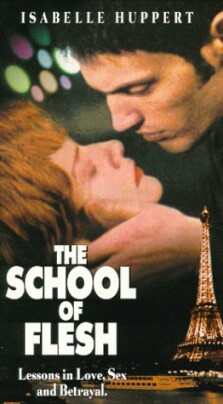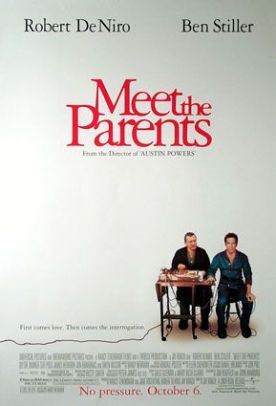Ecole de la Chair, L’ (The School of Flesh)
Hélas! The good-humored detachment and optimism that François
Truffaut brought to the French cinema seems to have died with him. Barring the
rare exception, like last year’s Un
Air de Famille by Cédric Klappisch, each new French film that manages
to get itself released in this country seems to try to outdo the last in hip
nihilism and terminal gloom. No wonder fewer and fewer of them do find an
audience here. So we read in the New York Times of I Stand Alone
(Seul Contra Tous) by the young Gaspar Noé that “it probes as
relentlessly into the psychology of nihilism as any movie has ever attempted.”
Now there’s a come-on! Even I, who have stalwartly sat through the most dreadful
rubbish that Hollywood has to offer on your behalf, frankly quailed at these
words. It was, I thought, time to draw a line in the sand. Richly as I am
rewarded for my labors, I’m not paid enough to submit myself
to I Stand Alone, which bids fair to live up to its title if only
“alone”
be qualified to include a handful of nuts and masochists.
Yet I did go, albeit with a heavy heart, to The School of Flesh, which
was directed by Benoit Jacquot from a screenplay (based on a novel by Yukio
Mishima) by Jacques Fieschi. It is truly a superior example of its kind, but its
kind is such a dreary and unpleasant stuff that it is hard to take delight even
in the stunning performance of the still-stunning Isabelle Huppert in the role
of Dominique, an older woman who becomes the victim of an amour fou for a
younger man. The amour on this occasion, is not nearly so fou as
it was in last year’s Post Coitum
Animal Triste — and all the better
for that. For although there was a certain charm in the operatic passion of
Brigitte Roüen in the leading role in the latter film, the cinema is more
congenial to the blistering realism with which Miss Huppert adumbrates the
middle-aged passion and desperation of poor Dominique.
M. Jacquot is likewise a perceptive observer and subtle artist who teases us
with a whole series of reversals of expectation when the well-to-do Dominique
condescends to pick up the half-Arab bartender and part-time prostitute who
calls himself Quentin (Vincent Martinez). She takes him out to dinner, for
example, at a swanky place she knows and proceeds to disapprove of his table
manners. Yet when an old acquaintance accosts her in the restaurant she is
shockingly rude herself in not introducing her dinner companion, trying to
pretend, in fact, that he is not there. Though she is the bourgeois daughter of
a physician (who was cold, though she loved him) and he is the rude boy of the
working classes, he is also more conservative than she, asking her why she
works, as she obviously has money and would not have to. To her amusement, he
inveighs against mothers who work, neglect their kids and get divorced.
The clash of their respective social backgrounds soon becomes a kind of
dialogue. When the food comes, Quentin picks up his sea bass with his fingers.
“Put it down,” she says.
“Why?” he asks.
“Because you’re with me,” she snaps.
He puts it down. But afterwards he walks ahead of her in the street, forcing
her to run to keep up. Then, instead of taking her home for the expected bout of
athletic sex, he decides to go play video games for an uncomfortably long time
and seems oblivious to her feelings as she stands around in the arcade,
surrounded by teenagers, with nothing to do. He is giving her a quick lesson in
sexual economy as it applies to their relationship. An attractive woman like her
may still have something of the young girl’s sense of her own sexual power, but
she has to learn and learn quickly that that power is now his. In this market,
she has become the eager buyer and he the seller, able to calculate to a nicety
how much what he has to offer is worth to her.
At the same time, his own fears of abandonment are if anything greater than
hers. “When I’m old you’ll be dead,” he says off-handedly once they have moved
in together. “But what would you do if I lost my arm, or my leg, or my cock.
Would you still love me?”
“I’d try to be — supportive,” she says, groping for an appropriate word
from the therapeutic vocabulary.
“But you wouldn’t love me?”
It may be the first time she has thought of love in connection with him, but
it opens the door to something far more powerful than she had bargained for when
she went shopping for a boy-toy. The casual cruelty with which he proceeds to
treat her when he spots a better deal — the virginal daughter of Dominique’s
best friend — is all the more devastating because he seems almost
unconscious of it. Childishly, he supposes that she must be as pleased as he is
that he has got himself engaged to the daughter of a rich industrialist. After
all, he says, he can still see her. “I’ll be a husband, not a monk.” Poor
Dominique! Hardly an actress in the world could convey the pathos of her
situation with the skill of Mlle Huppert, but in the end our human sympathies
seem to live on a very narrow margin of shore beside a sea of nihilism and
despair. What one wouldn’t give for a joke or two!
Discover more from James Bowman
Subscribe to get the latest posts to your email.







